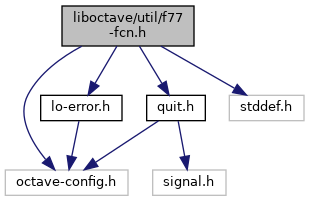#include "octave-config.h"
#include "lo-error.h"
#include "quit.h"
#include <stddef.h>
Go to the source code of this file.
◆ F77_CMPLX_ARG
| #define F77_CMPLX_ARG |
( |
|
x | ) |
reinterpret_cast<float _Complex *> (x) |
◆ F77_CONST_CMPLX_ARG
| #define F77_CONST_CMPLX_ARG |
( |
|
x | ) |
reinterpret_cast<const float _Complex *> (x) |
◆ F77_CONST_DBLE_CMPLX_ARG
| #define F77_CONST_DBLE_CMPLX_ARG |
( |
|
x | ) |
reinterpret_cast<const double _Complex *> (x) |
◆ F77_CSTRING
| #define F77_CSTRING |
( |
|
s, |
|
|
|
len, |
|
|
|
cs |
|
) |
| |
Value:
memcpy (cs, F77_CHAR_ARG_USE (s), F77_CHAR_ARG_LEN_USE (s,
len)); \
cs[F77_CHAR_ARG_LEN_USE(s,
len)] =
'\0'#define OCTAVE_LOCAL_BUFFER(T, buf, size)
Definition at line 327 of file f77-fcn.h.
◆ F77_DBLE_CMPLX_ARG
| #define F77_DBLE_CMPLX_ARG |
( |
|
x | ) |
reinterpret_cast<double _Complex *> (x) |
◆ F77_FCN
◆ F77_XFCN
| #define F77_XFCN |
( |
|
f, |
|
|
|
F, |
|
|
|
args |
|
) |
| F77_FUNC (f, F) args |
◆ F77_CMPLX
◆ F77_DBLE
◆ F77_DBLE_CMPLX
◆ F77_INT
| typedef octave_f77_int_type F77_INT |
◆ F77_INT4
◆ F77_LOGICAL
◆ F77_REAL
◆ F77_FUNC()

